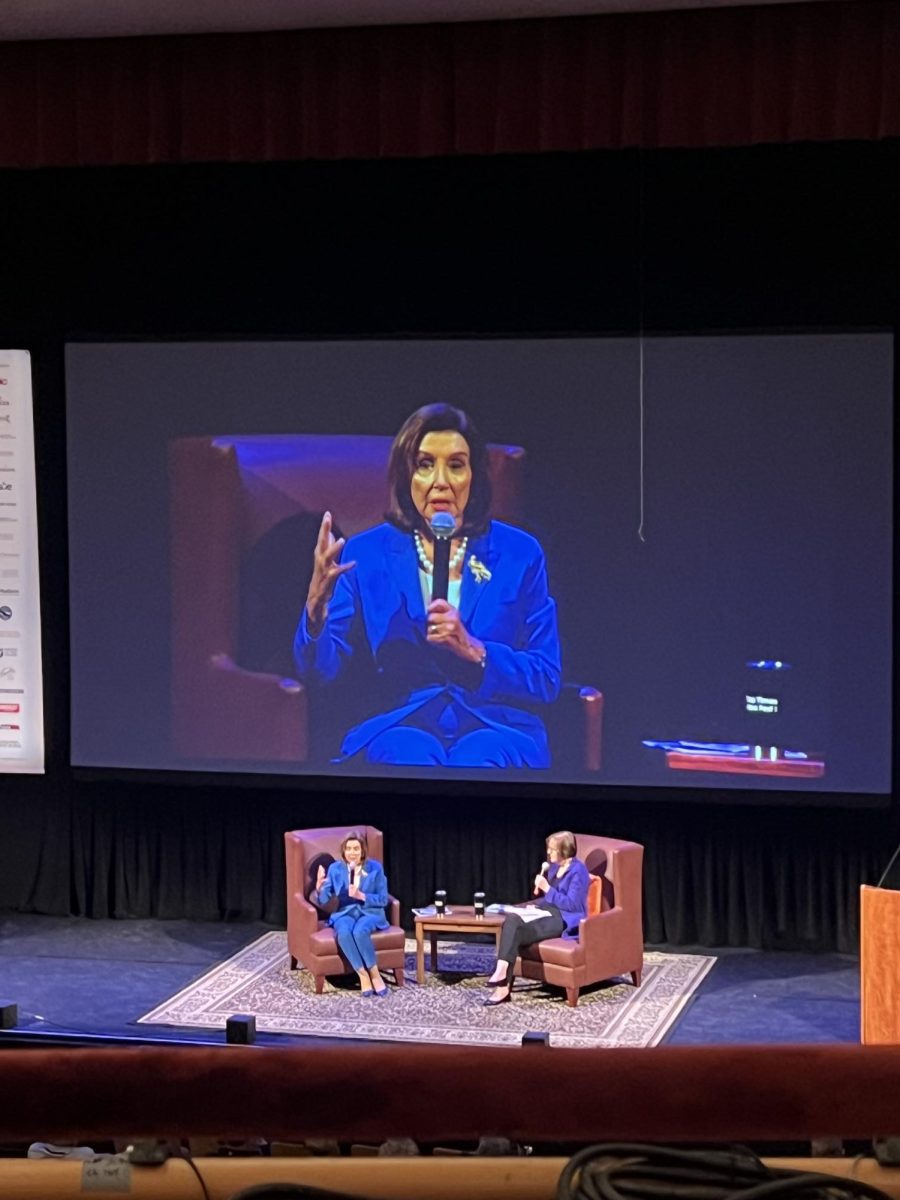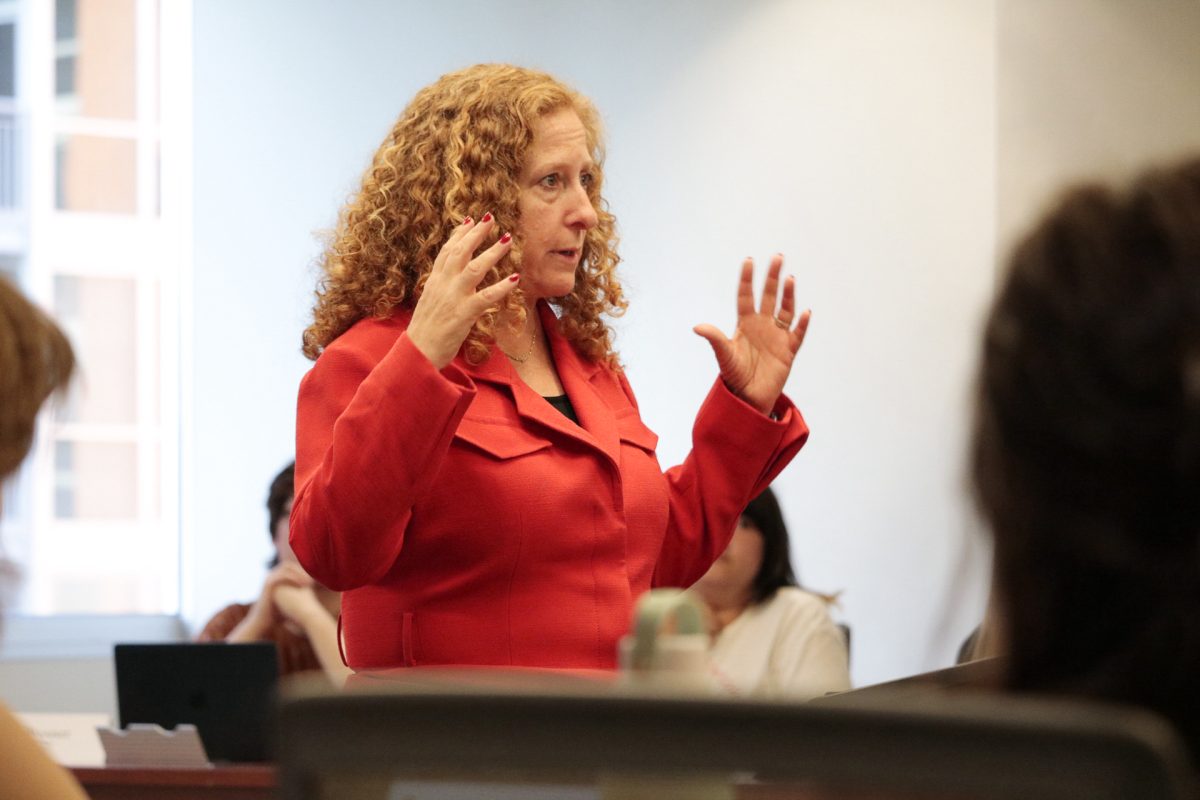On college campuses across the country last spring, presidential candidates Democrat Barack Obama and Republican John McCain stood in town hall meetings answering questions instantly streamed onto MySpace.
People watching through the Internet could, for the first time, participate in the action. As the candidates spoke, a large pie chart dynamically changed based on the reactions from online viewers to the candidates’ responses to posed questions.
The moderator looking at the changing chartsever-changing screen warnedadvised the candidates their answers were not playing out too well with the audience and posed them a question.
“Everyone here thinks you are a giving a lot of BS and not answering the question the person actually asked you,” said Lee Brenner, executive producer of political programming and director of IMPACT (public affairs) for MySpace. “Do you want to try it again?”
For the first time in history, the average citizen canwasbe instantly connected to the election through new media, and the role of public political forumpolitical voids isare being filled in ways other than newspapers, magazines, radio and television.
With that question, the dynamic had changed. While the political forum has long been the sole territory of the mainstream media, new media — such as social networks and blogs — are giving the the average citizen more direct control over the debate.
University of Wisconsin political science professor Kathy Cramer Walsh said media have always influencedhad an impact on how people think of politics.
“For most folks, they don’t have a direct relationship with politics,” Cramer Walsh said. “The media fills in those voids.”
Angelo Carusone, a blogger onmanaging editor of presidential election blog 2008central.net, said new media, especially social networking platforms such as blogs, YouTube, text messaging, MySpace and Facebook are changing the way American citizens connect with politics, and these tools show individuals can interact with the political realm in new ways..
“The average citizen can get into that town hall and ask questions directly to the leaders that want to be president of the United States,” Brenner said.
Social Media Sparking Interest in All Aspects of Politics
UW journalism professor Dhavan Shah said part of the reason election spending is up 40 percent in comparison to the 2004 presidential election, and is likely going to exceed a billion dollars because of new media.
Brenner said campaign strategists now use social media to fundraise and have changed the makeup of the political campaigns.
“I think more and more you are going to start seeing campaigns using this as a part of the strategy to use these media tools,” Brenner added. “Never again will it not be a core part of every campaign filtering down to Congress, local leaders and even student government.”
According to Shah, the idea of new media in politics began in the 2000 election when people started talking about the issues via email and message boards. Since then, political interest has been sparked by talking politics over the Internet, which ultimately engages people in discussion about issues or particular candidates.
Of course, it didn’t take long for the political strategists to catch on to a the new avenue of communication. Brenner said campaign strategists now use social media to fundraise and have changed the makeup of the political campaigns.
“I think more and more of you are going to start seeing campaigns using this as a part of the strategy to use these media tools,” Brenner added. “Never again will it not be a core part of every campaign filtering down to Congress, local leaders and even student government.”
Preston Austin, a software developer and Madison entrepreneur, said chatter can develop through social media devices based on participants responses.
“What is unique about the social media today is you have the ability to talk back through discussion threads,” Austin said. “You can start your own dialogue or participate in one that exists.”
For example, Brenner said, MySpace took the concept of dialoguing about issues and partnered for the first time with the debate commission to spur discussion on a range of issuestarget to its users during both the presidential and vice presidential debates.. Facebook used a similar technique during the New Hampshire primary presidential debates on ABC. Not only were users polled on a series of related debate points, but Facebook ran a running forum of second-by-second comments from viewers.
Not only are these sites letting users sound off the candidates, they’re helping push voters toward the information needed to make that decision on Election Day. Brenner said MySpace has built a tool to provide users with a quiz to determine whatich issues werehere most important to them. Once a scorecard was formulated for a MySpace user, they could decide whether to download it to their MySpace or Facebook page.
After the debates concluded, Brenner said, clips based on the issues users selected were fed directly into that scorecard making onlyhighlighting the clips of Obama and McCain on that particular issue available.
“Basically we personalized your debate to the decisions that are important to you when you want to make that decision on who to vote for,” Brenner said.
Shah said often social scientists said talk about the decline and reduction of political activity with younger voters, but what has really happened is a transformation through social media.
Partisan Usage
UW senior and Wisconsin’s voice foron national MTV’s Street Team 2008, a group of youth journalists covering the presidential election, Charlie Berens said social media changed the future of political campaigns and engaged a new audience when Obama announced his vice presidential nomination with a vast text message at 3 a.m.
“I think already people are starting to think in terms of how we can engage the youth,” Berens said. “It is a large floating demographic and MySpace, MTV — the Internet really engages you.”
Berens said a clear divide began between the two candidates centering on who was able to use social media to their advantage — Obama built his campaign off of text messages and email, while McCain choose not to.
The consequence, Carusone said, was Obama used social networking to raise record-breaking funds — $1.5 million in September alone.
Carusone said Obama argues this isas a better model thanfor public financing since donations come from a wider range of people.
Yet, McCain’s campaign was forced to use these devices to counteract much of the tactics of Obama’s campaign. As a result, Carusone said, Carusone said, McCain’s campaign chose to respond by spending an exorbitant amount of money and artificially matching Obama’s presence on the Internet.
In August, for example, McCain outspent Obama 22 to one in Internet advertising, while Obama’s website still gets six times more traffic, Carusone said.
“The result of that traffic is all the social networking that he (Obama) has and his campaign started on has nurtured and developed throughout this campaign in the primaries and general election,” Carusome said.
The Concerns about Social Media in Future Elections
While somemany see social networkingmedia as abeing positive force during this campaign season, Carusonme said it does raise some concerns.
Once more people understand how these networks operate, it is possible individuals can “abuse and misuse” them, increasing the amount of negative campaigning streamed throughout elections, Carusonme said.
Also, Carusonme added, social media can harden opinions when people tend to only use sights and affiliate with organizations that tend to agree with them politically.
“It is still not a vast political discussion where you are engaging with people that have differences than you,” Carusonme said. “My concern with social media is further separating ourselves along the political spectrum which tends to harden political thought.”
In addition, Carusonme said, social media create an environment of complacency whereby joining a Facebook group is considered a type of civic participation but not engagement in any valuable way.
Others, like Berens, question social media’s validity especially when people use blogging sites like Twitter — a service that allowsallowing users to send and read other users’ text-based posts of up to 140 characters in lengths.
“When you go to Twitter and respond quickly do you know all the facts and are they right?” Berens said. “It questions the basic principle of journalist integrity.”
Despite concerns, social media is the future, Brenner said.
“It has the potential to further open conversation and engage in political dialogue all in one place,” Brenner said.












